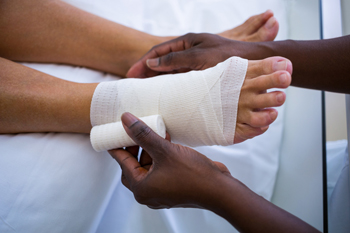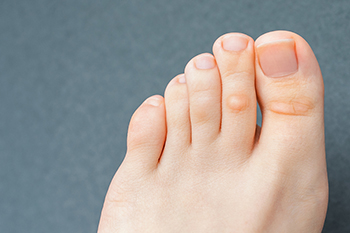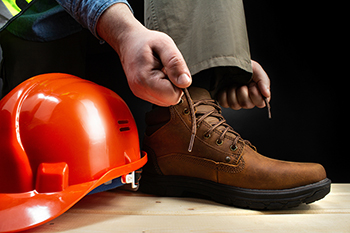
(616) 846-3400
Fax: (616) 846-3406

(616) 846-3400
Fax: (616) 846-3406

Abrasions are surface skin wounds or injuries. Typically, they can easily be treated at home, but if the abrasion is deep it may require medical care. Minor or superficial abrasions generally affect the top layer of skin and do not bleed. Deep abrasions affect deeper layers of skin and may leave a scar. Foot abrasions can happen to anyone but are especially common in children and older people who have less motor coordination. These types of wounds can occur from a variety of things including falling, repetitive irritation to the skin, or pressure from ill-fitting shoes. When there is a break in the skin, there is always a risk of infection. To prevent infection, it is important to clean the wound, cover it with a bandage, and check it frequently. If you have incurred an abrasion on your foot it is suggested that you visit a podiatrist for treatment.
Wound care is an important part in dealing with diabetes. If you have diabetes and a foot wound or would like more information about wound care for diabetics, consult with Dr. Robbi Young from Grand Haven Foot & Ankle. Our doctor will assess your condition and provide you with quality foot and ankle treatment.
What Is Wound Care?
Wound care is the practice of taking proper care of a wound. This can range from the smallest to the largest of wounds. While everyone can benefit from proper wound care, it is much more important for diabetics. Diabetics often suffer from poor blood circulation which causes wounds to heal much slower than they would in a non-diabetic.
What Is the Importance of Wound Care?
While it may not seem apparent with small ulcers on the foot, for diabetics, any size ulcer can become infected. Diabetics often also suffer from neuropathy, or nerve loss. This means they might not even feel when they have an ulcer on their foot. If the wound becomes severely infected, amputation may be necessary. Therefore, it is of the upmost importance to properly care for any and all foot wounds.
How to Care for Wounds
The best way to care for foot wounds is to prevent them. For diabetics, this means daily inspections of the feet for any signs of abnormalities or ulcers. It is also recommended to see a podiatrist several times a year for a foot inspection. If you do have an ulcer, run the wound under water to clear dirt from the wound; then apply antibiotic ointment to the wound and cover with a bandage. Bandages should be changed daily and keeping pressure off the wound is smart. It is advised to see a podiatrist, who can keep an eye on it.
If you have any questions, please feel free to contact our office located in Grand Haven, MI . We offer the newest diagnostic and treatment technologies for all your foot care needs.

A small, thickened area of skin on the foot may be a corn. It can cause severe pain, despite its small size. A corn develops as a result of excess friction that generally comes from wearing socks or shoes that are too tight. Frequent rubbing against the shoe can cause a corn to form on the pinky toe or top of the toes. Many people who have a corn notice their walking style shifts to accommodate for the discomfort felt. In addition to wearing shoes and socks that do not fit well, a corn can happen if the toe is deformed or if there is poor bone alignment. Mild relief may be found when the foot is soaked in warm water as this may help to soften the corn. At this point, a pumice stone may be used to gently file the corn down, although this is a temporary solution. If you have a corn on your foot, it is suggested that you visit a podiatrist who can remove it and provide methods to prevent future corns from developing.
Corns can make walking very painful and should be treated immediately. If you have questions regarding your feet and ankles, contact Dr. Robbi Young of Grand Haven Foot & Ankle. Our doctor will treat your foot and ankle needs.
Corns: What Are They? And How Do You Get Rid of Them?
Corns are thickened areas on the skin that can become painful. They are caused by excessive pressure and friction on the skin. Corns press into the deeper layers of the skin and are usually round in shape.
Ways to Prevent Corns
There are many ways to get rid of painful corns such as:
Treating Corns
Although most corns slowly disappear when the friction or pressure stops, this isn’t always the case. Consult with your podiatrist to determine the best treatment option for your case of corns.
If you have any questions please feel free to contact our office located in Grand Haven, MI . We offer the newest diagnostic and treatment technologies for all your foot and ankle needs.

Standing for long periods of time during the work day can wreak havoc on the feet. Sore and swollen feet are common complaints from people who stand for the majority of the day at work. Excessive pressure on the feet from standing for long periods may cause insufficient blood flow, leading to overall fatigue and foot discomfort. It is beneficial to shift the body weight from one foot to the other as often as possible, which may help to improve blood supply to the feet. Additionally, it is vital to wear shoes that fit correctly and the feet may feel better while standing on an anti-fatigue mat. Performing foot stretches during a break at work may soothe aching muscles and may help to improve overall productivity. If you have a job that requires standing for long periods of time, it is suggested that you speak to a podiatrist who can provide you with additional tips on how to protect your feet while at work.
While working on the feet, it is important to take the proper care of them. For more information about working on your feet, contact Dr. Robbi Young from Grand Haven Foot & Ankle. Our doctor will treat your foot and ankle needs.
Working on Your Feet
Standing on your feet for long periods of time can cause stress and pain in your feet. Your whole body may experience change in terms of posture, back pain, bunions, callouses and or plantar warts. There are ways to avoid these conditions with proper foot care, smart choices and correct posture.
Positive Changes
Negative heeled shoe – Choosing this shoe type places the heel slightly lower than the ball of the foot. These are great for overall foot health. Find shoes that fit you correctly.
Go barefoot – Our feet were not designed to be enclosed for all hours of the day. Try to periodically expose your feet to air.
Eliminate Pain
Foot Exercises – Performing simple exercises, incorporating yoga and doing stretches are beneficial. This will allow increased blood flow to the area and muscles of the foot.
Achilles tendon – Stretching the foot out flat on the floor will relax the calf muscles and tendon. These exercises can be performed almost anywhere. Make sure you add these exercises to your daily regimen.
With a little bit of this information and knowing more about foot health, you will notice changes. Foot stretches and proper footwear will help with pain and prevent further issues.
If you have any questions please feel free to contact our office located in Grand Haven, MI . We offer the newest diagnostic and treatment technologies for all your foot and ankle needs.